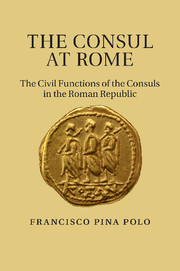Book contents
- Frontmatter
- Contents
- List of illustrations
- Acknowledgements
- Introduction
- PART I THE CONSULAR FUNCTIONS IN THE PRE-SULLAN AGE (367–81)
- 1 The consuls taking office
- 2 Consuls and civic religion
- 3 Consuls, the agents of diplomacy in the Roman state
- 4 Communication between the consuls and the people: edicts and contiones
- 5 Consuls as legislators
- 6 The jurisdiction of the consuls
- 7 Consuls as promoters of public works
- 8 Colonization and distribution of land
- 9 Appointment of a dictator
- 10 Consuls presiding over elections
- 11 The consular year in the pre-Sullan age
- PART II THE CONSULAR FUNCTIONS IN THE POST-SULLAN AGE (80–50)
- 15 Conclusion
- Bibliography
- Index of Subjects
- Index of Ancient Sources
- Index of Ancient Personal Names
11 - The consular year in the pre-Sullan age
Published online by Cambridge University Press: 25 October 2011
- Frontmatter
- Contents
- List of illustrations
- Acknowledgements
- Introduction
- PART I THE CONSULAR FUNCTIONS IN THE PRE-SULLAN AGE (367–81)
- 1 The consuls taking office
- 2 Consuls and civic religion
- 3 Consuls, the agents of diplomacy in the Roman state
- 4 Communication between the consuls and the people: edicts and contiones
- 5 Consuls as legislators
- 6 The jurisdiction of the consuls
- 7 Consuls as promoters of public works
- 8 Colonization and distribution of land
- 9 Appointment of a dictator
- 10 Consuls presiding over elections
- 11 The consular year in the pre-Sullan age
- PART II THE CONSULAR FUNCTIONS IN THE POST-SULLAN AGE (80–50)
- 15 Conclusion
- Bibliography
- Index of Subjects
- Index of Ancient Sources
- Index of Ancient Personal Names
Summary
As we have seen in the previous chapters, once the consuls took office, they stayed on in Rome for a number of weeks before setting off for their provinces to take command of their armies. During this time they were required to attend to a series of civil functions, the multiplicity of which explains Polybius' assertion that during their presence in Rome, the consuls were the supreme magistrates of the administration of the Roman state, always subordinate to the senate. When the consuls left the Urbs to command their armies, supreme political responsibility in the city was transferred to the urban praetor, who dealt with most of the duties that would have fallen to the consuls had they been present in Rome.
On the very day they took office, after visiting the Capitol together, the two consuls attended a meeting with the senate at which all the topical political questions, and above all the military situation, were discussed. It was a genuine debate on the ‘state of the community’, which preceded the allocation of the annual provinces amongst the higher magistrates and the fixing by the senators of the number of soldiers to be levied, as well as their distribution amongst the magistrates with imperium.
In the religious field, it was compulsory for the consuls to pronounce the public vows (vota publica) on the Capitol on their first day as magistrates, and they also had to assign the date for the celebration of the feriae Latinae, see to the expiation of the prodigies that had occurred in the previous months both in Rome and in Italy, and preside over the Latin festival on the Mons Albanus.
- Type
- Chapter
- Information
- The Consul at RomeThe Civil Functions of the Consuls in the Roman Republic, pp. 208 - 222Publisher: Cambridge University PressPrint publication year: 2011

